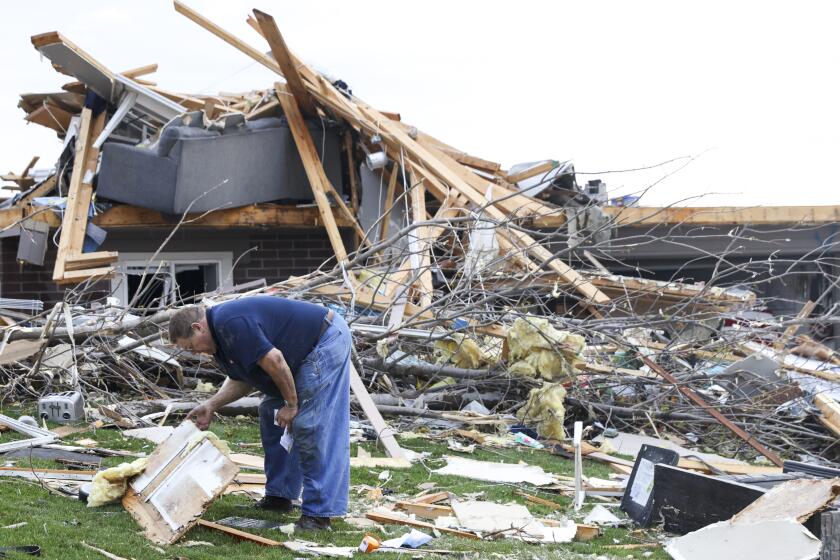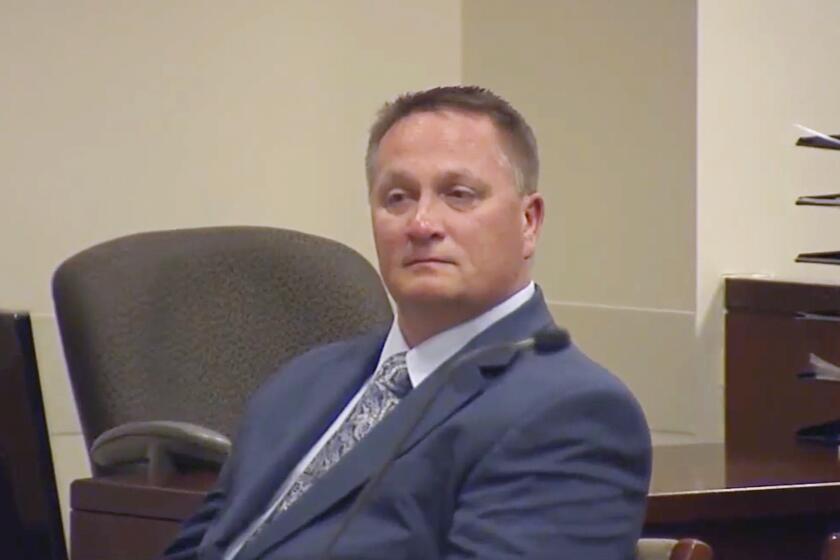BP will create fund to pay claims
Reaching one of his top goals in the gulf oil spill crisis, President Obama announced Wednesday that BP had agreed to create a $20-billion fund that will pay damages to fishermen, small businesses and others who suffered financial losses in the worst environmental disaster in U.S. history.
The agreement, which came after a sober, four-hour meeting at the White House between Obama and BP executives, will result in the company feeding $5 billion a year into the new escrow fund through 2013. BP will also suspend dividend payments for the rest of the year, another step toward ensuring that an ample pot of money is on hand to pay out claims.
At Obama’s insistence, the British oil company will not control the fund or decide who gets reimbursed for losses. A neutral party, Kenneth Feinberg — who played a similar role after the Sept. 11 attacks, overseeing the fund set up to compensate victims — will run the payment system. If Feinberg rejects a claim, claimants will have the right to appeal to a three-person panel.
In addition, BP earmarked $100 million to compensate oil workers who’ve lost their jobs as a result of the moratorium on deep-water drilling the government has declared since the accident. To date, the company said it has spent $1.75 billion on containing the spill and on cleanup.
By laying out the escrow money, BP is not escaping liability for cleanup of the Gulf of Mexico, White House officials said. Nor will the payment immunize the firm from potential criminal charges. The Justice Department is examining whether BP or others broke any laws when the Deepwater Horizon oil rig exploded on April 20, killing 11 workers and creating the spill disaster.
“We got everything we wanted,” White House spokesman Robert Gibbs said in an interview.
The closed-door meeting opened with an apology from the company’s Swedish chairman, Carl-Henric Svanberg. Obama accepted, a White House spokesman said.
Obama was in and out of the meeting and spoke privately to Svanberg for about 25 minutes in the Oval Office. After leaving the White House, Svanberg addressed reporters, with his company’s chief executive, Tony Hayward, standing behind him. Hayward has been ridiculed in the U.S. as the public face of BP, earning no sympathy when he complained recently, “I’d like my life back.”
Svanberg said that Obama is “frustrated because he cares about the small people and we care about the small people.”
“I hear comments sometimes that large oil companies are greedy companies or don’t care. But that is not the case with BP. We care about the small people,” he said.
Hayward is expected to strike a contrite tone in his testimony Thursday at a congressional hearing, his first such appearance. According to a text of his planned remarks, Hayward will say, “I fully grasp the terrible reality of the situation. ,I hear the concerns, fears, frustration — and anger — being voiced across the country.”
The energy giant will finance the $20-billion escrow fund in part by suspending its dividends for the rest of the year, freeing up an estimated $7.5 billion that otherwise would have gone to shareholders, selling $10 billion in assets and other measures. BP said in a statement that it would cancel its scheduled first-quarter payment Monday and won’t declare dividends in the second or third quarters.
Cancellation of the dividend is certain to produce a backlash in Britain, where BP payments provide a substantial share of pension fund income.
BP’s U.S.-traded shares rose Wednesday, climbing $1.43, or 0.5%, to $31.85 on heavy trading volume. The stock jumped immediately after the announcement of the escrow fund and again after the dividend suspension.
Creating the escrow fund is one the Obama administration’s few concrete achievements since the oil began gushing 58 days ago. Unable to plug the hole beneath the gulf, the White House has sought to take command of a worsening environmental catastrophe that has hijacked the president’s agenda. On Tuesday night, Obama gave the first Oval Office speech of his presidency, using military metaphors to convey a sense that he is fully in charge and sensitive to the plight of oil spill victims.
After reaching the agreement, Obama gave a brief address from the State Dining Room. He said the $20-billion figure is not a cap, meaning BP could potentially add to that sum.
He said he told Svanberg “that for the families that I met with down in the gulf — for the small-business owners, for the fishermen, for the shrimpers — this is not just a matter of dollars and cents. A lot of these folks don’t have a cushion. They were coming off [Hurricanes] Rita and Katrina — coming off the worst economy that this country has seen since the Great Depression — and this season was going to be the season where they were going to be bouncing back.”
Getting BP to pay damages is a politically popular step. A Gallup poll shows that 59% of Americans believe BP should pay all losses stemming from the spill, even if that destroys the company. What’s more, the public doesn’t want Obama to coddle the oil giant; 71% said the president has not taken a tough enough stance with BP, according to Gallup’s polling.
As Obama met with BP officials, Gulf Coast lawmakers stepped up their efforts on Capitol Hill to lift the administration’s six-month deep-water drilling moratorium that they contend is threatening their region’s fragile economy.
Sen. Mary L. Landrieu (D-La.) went to the Senate floor to declare that the moratorium could cause “even more economic damage than the spill itself” to her state.
“I know that we have to make sure that these 33 floating rigs that drill in deep water [in the Gulf of Mexico] … are safe,” she said, “but I want to say unequivocally, with support of the vast majority of people in my state, six months is too long. The deep-water industry cannot survive in the gulf with a six-month pause.”
A bipartisan group of the lawmakers is scheduled to meet with Interior Secretary Ken Salazar in the Capitol to discuss their concerns about the moratorium. Legislation to allow deep-water drilling to resume also has been introduced with the backing of not only Gulf Coast lawmakers but a number of pro-drilling lawmakers from other states who say the moratorium threatens an important supply of domestic oil.
Meanwhile, progress on capping the spill has been uneven.
On Wednesday, BP introduced a new system for collecting some of the oil spilling into the Gulf of Mexico, bringing the total daily containment capacity to 28,000 barrels a day. That’s a fraction of the estimated 35,000 to 60,000 barrels flowing daily from the undersea well.
The new system uses equipment from a previous failed attempt to plug the well known as the “top kill” strategy, which sought to stanch the leak with heavy drilling fluid. Since then, the equipment has been tweaked to suck oil from the well’s failed blowout preventer and through a series of hoses to a ship on the gulf’s surface, where it will be burned off.
The new system can take up about 5,000 to 10,000 barrels per day, and will operate concurrently with an existing containment cap system that has the capacity to take up 18,000 barrels per day. To date, however, the containment cap has been collecting, at best, about 16,000 barrels a day.
Nicholas reported from Washington and Hamilton from Los Angeles. Times staff writers Richard Fausset in Atlanta, Richard Simon and Jim Tankersley in Washington and Ronald D. White in Los Angeles contributed to this report.
More to Read
Start your day right
Sign up for Essential California for news, features and recommendations from the L.A. Times and beyond in your inbox six days a week.
You may occasionally receive promotional content from the Los Angeles Times.






